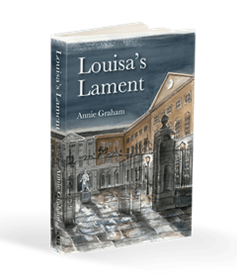Louisa’s Lament was created by Dr Pat Oakley, writing as the novelist Annie Graham. The idea began 30 years ago, during her research into medical power and conflict, when she saw a footnote alluding to trouble at Guys Hospital between nursing and medical staff, in 1880. She promised herself that if she had the chance, one day she would find out more. The plot thickened when it appeared that the hospital records from 1879 -1882 were missing from the archive. Further searching and the help of a determined archivist unearthed the lost files, which reveal the shameful events leading to the ruin of the dedicated nurse Louisa Ingle. Armed with the original records, correspondence, newspapers, journals and the satirical press, Old Bailey records and prison archives, the book was born.
The 1880s were a turbulent time in many arenas, not least hospital and nursing reform. Pioneers such as Florence Nightingale and Sister Dora Pattison were followed by a second wave of trained nurses, who were pushing the boundaries of their work and challenging the authority of doctors and hospital boards. They met opposition on many fronts: on their gender as they questioned the proper place of men to be in authority and women to be led. On their religion as the influence of Anglican Sisterhoods was - often unjustifiably - pitted against the nonconformist beliefs of many doctors. And on class where the high minded but inexperienced lady nurses were seen to vilify the practice of existing staff, encroaching on their domains, and threatening their livelihoods.
Many such disputes are recorded in hospital minute books and the press of the time, but at Guys it was particularly vitriolic: as the Matron Miss Margaret Burt became embroiled in a vicious battle for authority, three of her lady nurses, Miss Victoria Jones, Miss Margaret Lonsdale, and Miss Louisa Ingle got caught in the crossfire. Things came to a head when, after the death of a patient, the medical staff conspired for Louisa to be accused of neglect, leading to her dismissal, trial at the Old Bailey for manslaughter and imprisonment. Disgraced and broken, Louisa eventually made a new life for herself in India, where she remained for the rest of her life.
Lousia’s Lament is a real page-turner. Written with passion and pace it gets inside the heads of the characters involved and brings them to life: The doctors’ shameless lies and manipulation of the press, for their own ends. The impossible position of the matron, as she steadfastly tries to bring about essential reforms. The comedy of confused manners where Miss Lonsdale - head and shoulders of a higher class than the doctors - causes mayhem as she arrogantly takes them on face to face and in the national press. And the central character Louisa, who after many years living anonymously in India breaks down, following a letter from England that rekindles the horror of losing her life as she knew it. She relives the descent literally and figuratively from respected, committed lady nurse to disgraced imprisonment in the bowels of the Old Bailey holding cells and Newgate prison. You do not want to put it down until you know what happened.
Despite being totally swept up by the plot I was aware that this was an historian, choosing very pointedly to write fiction. I knew enough of the period, and of archival research to see that the text was data-rich and informed by meticulously gathered detail from across multiple sources. This left me with two questions: Why fiction, and where, for the author, did the line between fact and fiction lie?
In conversation with Dr Oakley, and through her website one motivation for fiction is to reach a wider audience than a history text, no matter how well researched, is likely to achieve. When I was planning this blog, I happened to take a walk through the woodland surrounding Craiglockhart in Edinburgh. Our talk turned to William Owen and Siegfried Sassoon - imagining them walking these same paths, trying to make sense of the senseless war they were damaged by. I know that my understanding of their mental trauma, and my emotional engagement with it is informed far more by Pat Barker’s Regeneration Trilogy novels, than all the facts and figures – no matter how well known they are. A novel can reach more people more viscerally than a history book.
A second is to engage much more deeply in the emotion and psychology of oppression, bullying and the related trauma that can happen in organisations: the events at Guys, close to 150 years ago are sadly too familiar in modern health organisations. By reimagining the thoughts and experience of Louisa the novel invites us to step beyond the ‘facts’ of the case and recognise the impact conflict has on the individuals involved.
The wealth of data available means the leap from facts to fiction is well informed: There is no need to imply a plot on the part of the doctors or put words in their mouths, as they documented all their meetings. The Old Bailey trial records give a verbatim report of proceedings and the humiliating imprisonment rituals of being stripped and checked for hair and body lice are also known. The Old Bailey is still in use: Dr Oakley was able to walk down the same steps from the court, sit in the same holding cell that Louisa herself had occupied and breathe life into her.
The use of Louisa’s story as the narrative arc for the novel puts the matron Miss Burt who, like many of her generation displayed remarkable courage and fortitude in the face of powerful opposition, into the background. As a nurse historian I would have been interested in knowing more, but Dr Oakley’s choice of novel wins the day for me.

Louisa’s Lament is from £12.99 in paperback and can be purchased from book shops or direct.
All proceeds are donated to the Birkbeck College Student Hardship Fund.


 Share on LinkedIn
Share on LinkedIn




